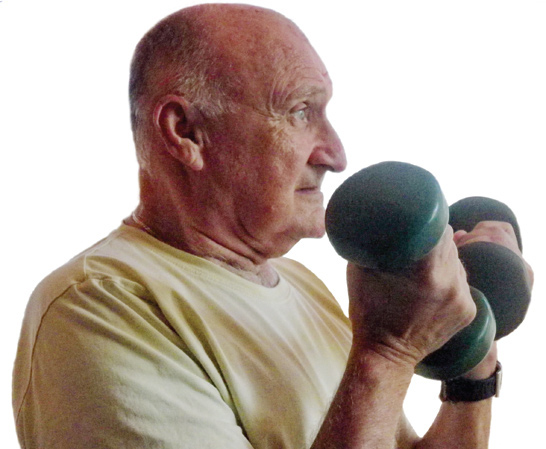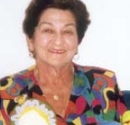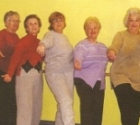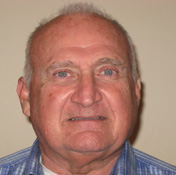
Motti Zaslow
The study of fitness and good health has been a hobby of mine as well as a major concern. It began when, at the age of 40, my mother had first showed the effects of the rheumatic fever she had had as a child and she began her battle against severe heart disease. She died at the age of 55 after also developing diabetes and having undergone heart surgery.
When I was a sophomore in college I had to take a year off because of financial problems and had the good fortune to work in a building construction concern where I shared an office with a man who was into health care and made me aware of what was involved in living a healthy life. He had already forbade his nine year old son to eat candy and anything that had sugar in it. He brought me pamphlets on vitamins, exercise and the importance of eating foods that were organically grown. I began to listen to Dr. Carlton Fredericks on the radio and search for "health food stores" where I began a lifelong habit of taking vitamins. This was in the early 1950s and people with such a bent were referred to as health faddists and out of touch. If you talked to a doctor about having less fat in your diet or the importance of eating more vegetables and fruit, you were laughed at because they said it was all tied into the genes and these things had nothing to do with whether you enjoyed good health or not. Medical professionals were among the last to correlate a relationship between diet, exercise, vitamin supplements and good health.
When my mother died I got physically and emotionally ill. I just couldn't function and had no energy and saw myself becoming what I had always feared, a sickly, non-functioning tired old man who was in his early 30s. It was during this time that I discovered that a new word had been added to the English vocabulary. It was ‘aerobics’ and the man who had invented this new word was Dr. Kenneth Cooper, a former doctor in the Air Force who had people jogging, swimming, rope jumping and doing other exercises that got one to really sweat and get the heart pumping to help in the fight against heart disease and other illnesses that were taking their toll on the American public. I bought his book and all the subsequent books he wrote and devoured them while adopting an athletic sports oriented lifestyle that became a part of my regular everyday routine. I also read other American gurus of health and nutrition of the time, many of whom turned out to be false prophets with no real formal background in the health fields. There was also a book called Sugar Blues that became the Bible of those involved in nutrition. The author blamed all the problems of history on refined white sugar and its use in almost everything that humans put into their mouths. Today, fructose and corn syrup have taken over the role of sweetening just about everything.
I've been lucky. It only took me another 35 years before I fully learned the value of both changing my diet and getting the full benefit of a good, healthy life style. But one of the key elements I did learn about better health is that it's not all in your genes and family history. Recently I read a book called Spectrum by Dr. Dean Ornish, who was a medical advisor to the Clinton Administration and today heads up "The Nonprofit Preventive Medicine Research Institute" and has published articles based upon studies published in the Lancet Oncology and the Proceedings of the National Academy of Sciences. These studies show that if you change your lifestyle which means a different type of diet, lower in fat, and refined carbohydrates and eating more natural foods, you can indeed change your genes for the better. Other studies conducted at the University of California indicate that lifestyle changes can significantly increase the DNA- repairing enzyme, telomerase, in only three months.
I have a family history dating back to a paternal grandfather who developed diabetes in his 50's and took injections until his death at age 72. Both my parents were diabetics and from the time my mother died and my father came to live with me and my family, I gave him his injections on a daily basis. He died at 67 of heart disease. I have a brother who is also a diabetic and he gets injections three times a day. When I helped my older brother move his home after his wife died several years ago, I watched in amazement at how his sickness had taken over his life, and most of his waking hours were spent testing and readjusting his insulin intake. During the three or more weeks we lived together his illnesses limited and confined his life to his home, only occasionally interrupted by a visit to one of his medical specialists.
From Dr. Cooper I learned that increasing my activity level and earning the 30 points a week that he recommended for a variety of sports activities could also help me avoid the pitfalls of both diabetes and heart disease, which my brother has unfortunately also developed. Dr. Cooper had recommended that professional athletes should attempt to earn 50 points a week to maintain the highest level of fitness. Never a great athlete, I aspired to and was able to reach the highest levels, first by jogging four or five times a week, rope jumping and later in life swimming and taking lots of long walks. I've learned with the years that walking is the best exercise since low impact aerobics avoid knee and other joint injuries. It works and I've managed to avoid diabetes, and heart disease and have a resting pulse rate of 52-56 on any day and a blood pressure that is in the range of 110/70 to 120/80. My doctor finds this surprising for a man my age, but says it does indicate the value of exercise and is a tribute to my years of physical exertion.
Why should anyone care about this and how does this help you?
According to the latest medical reports, no matter what condition you're in and how bad your health, by trying to do something today, you can make a difference and it doesn't have to take a great deal of time or effort. Dr. Ornish and Dr. Joel Fuhrmann, a New York cardiology specialist, who wrote a book called Eat to Live, believe that with proper diet and exercise you can reverse the awful effects of heart disease and diabetes. Ornish believes it's a three step approach that also involves meditation which can help eliminate stress. He advocates deep breathing, yoga and any other stress management techniques that make you relax, along with a variety of exercise of 30 minutes a day and a diet primarily based on vegetables, fruit, unrefined carbohydrates and low fat proteins. All the experts I have read believe that red meat should be eliminated from the diet or at least constitute a very small portion of what you eat.
In past years when I heard reference to senior citizens as being in their "golden years" I always thought of it as pap and no more. None of us is going to live forever. I always jokingly told my children that "ain't none of us getting out of this alive." What I want and hope I can achieve from living a healthier lifestyle is a better quality of life and one that won't leave me beholden to, dependent or a burden on anyone. I wish the same for all of you.
 DEAR EDITOR 157 MAGAZINE
DEAR EDITOR 157 MAGAZINE COUNTING ON INFERENCE
COUNTING ON INFERENCE SHULAMIT LAMIE RAVINSKY 1925-2010
SHULAMIT LAMIE RAVINSKY 1925-2010 Yad Sarah's new house in Raanana
Yad Sarah's new house in Raanana English speaking Feldenkreis
English speaking Feldenkreis Men don't Make Passes at Girls who Wear Glasses
Men don't Make Passes at Girls who Wear Glasses Motti Zaslow
Motti Zaslow